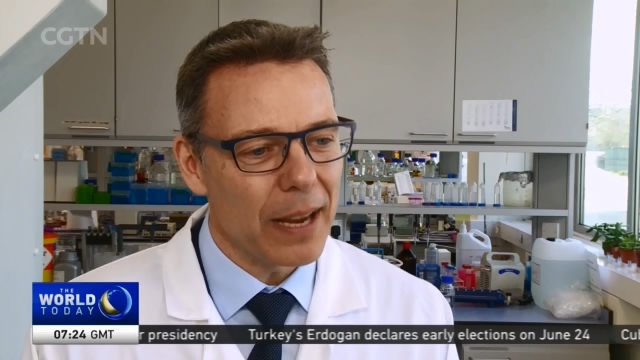
15:49, 19-Apr-2018
Wasteful Consumption: Scientists create mutant enzyme that devours plastic
02:41

Scientists in the UK have accidentally created a mutant enzyme that eats plastic bottles at a faster rate. It's hoped the breakthrough can help solve one of the planet's most serious pollution problems - a global plastic pollution crisis. Richard Bestic's been talking to some of the scientists behind the discovery at Portsmouth University on Britain's South Coast. Here's what he found.
The new research was spurred by the discovery of bacteria that had naturally evolved to eat some of our most commonly polluting plastics.
And now a global team of scientists has revealed they've engineered an enzyme in the bacteria that radically speeds up that process.
PROF. JOHN MCGEEHAN STRUCTURAL BIOLOGIST "We weren't trying to make a better enzyme, actually. We were just trying to understand how it had evolved. And that's the great thing about science, is that sometimes unexpected things happen. And what we discovered was that one of the changes that we'd made to the enzyme made it faster."
The discovery is hugely significant. A meteoric rise in demand for single-use plastic around the world means efforts at recycling are failing to keep up.
A problem heightened by China's policy decision to refuse the West's discarded plastics, creating a crisis within the recycling industry in Europe and the United States.
With the world's oceans awash with plastic, the discovery offers a potential recycling solution for millions of tons of waste at sea and on land.
As the mutant enzyme can break down most plastics in common use significantly faster than the centuries it takes in the oceans.
Efforts now aimed at achieving even faster results and on an industrial scale.
PROF. JOHN MCGEEHAN STRUCTURAL BIOLOGIST "These plastic bottles are surviving out there up to centuries, so to find something that can eat it even in days is incredible. If we can get that down to hours we can really do something quite special here. People will still need to collect the plastic and get it to recycling plants, but after that, we should be able to properly recycle it back into its original components."
RICHARD BESTIC PORTSMOUTH UNIVERSITY "Clearly more research to be done before enzymes can be used on bottles like this one on the industrial scale. However, the work done here has triggered interest from research institutes around the world – including six calls from inside China. Richard Bestic, CGTN at Portsmouth University on England's South Coast."

SITEMAP
Copyright © 2018 CGTN. Beijing ICP prepared NO.16065310-3
Copyright © 2018 CGTN. Beijing ICP prepared NO.16065310-3